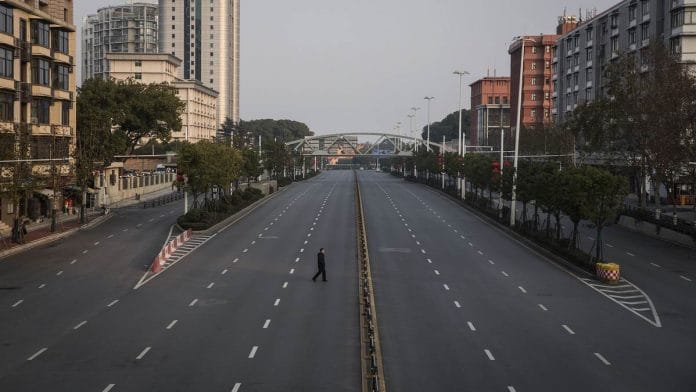New Delhi: There were no new confirmed Covid-19 cases in the post-lockdown months of May and June in Wuhan, where the novel coronavirus is believed to have originated, a sero survey stated.
The survey, conducted between 14 May and 1 June, gives a glimpse of the post-Covid scenario in the Chinese city.
According to the study published in Nature Communications on 20 November: “The screening of the 9,865,404 participants without a history of Covid-19 found no newly confirmed Covid-19 cases, and identified 300 asymptomatic positive cases with a detection rate of 0.303/10,000.”
Of all the 11 million residents of the city, 93 per cent (9,899,828) were tested using a Nucleui acid test process — the eligibility age for the test was 6 years and above.
The study found that the asymptomatic positive rate was the lowest in children or adolescents aged 17 years and below, and the highest among the elderly aged 60 years and above.
Also read: Covid virus developed in Wuhan lab, highly mutant — Hong Kong virologist says she has evidence
Additional samples collected from market settings
The lockdown in Wuhan was imposed from 23 January to 8 April. The study stated that after the city’s reopening, there were only six new confirmed cases — between 8 April and 10 May.
It was observed that the incidence of asymptomatic infected cases was higher in districts that previously had a high Covid infection rate.
Talking about the asymptomatic cases, the report further said: “Higher detection rates of asymptomatic infected persons were in Wuchang, Qingshan and Qiaokou districts”.
The study also found that 63 per cent (300 individuals) of asymptomatic cases were infected with SARS-CoV-2 virus.
“Serological antibody testing in the current study found that at least 63 per cent of asymptomatic positive cases were actually infected with SARS-CoV-2 virus,” it said.
The 300 asymptomatic positive persons were aged from 10 to 89 years, and included 132 males and 168 females.
The city administration, in order to check the spread of the virus, also collected additional samples from market settings.
“Further testing of SARS-CoV-2 in samples collected from market environment settings in Wuhan were conducted, and found no positive results after checking a total of 52,312 samples from 1,795 market settings during 13 June to 2 July, 2020,” the study said.
About 50,000 health professionals, including doctors and nurses, from community health centers, and about 2,80,000 community workers and volunteers were involved in the process of sample collection.
Limitations
The study, however, flagged the limitations of false negatives.
The report stated: “Although a positive result of nucleic acid testing reveals the existence of the viral RNAs, some false negative results were likely to have occurred, in particular due to the relatively low level of virus loads in asymptomatic infected individuals, inadequate collection of samples, and limited accuracy of the testing technology.”
Another limitation that was pointed out was that about 7 per cent of the eligible citizens did not participate in the screening and the reason for the non-participation was not determined.
The study also stated that asymptomatic patients couldn’t be monitored for a long-term.
“… We were unable to assess the changes over time in asymptomatic positive and reoperative results,” it said.
Also read: Tourists, clubs, parties — In Wuhan, ground zero of pandemic, life goes on






